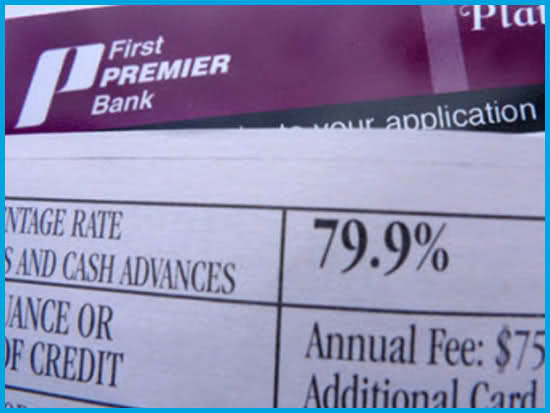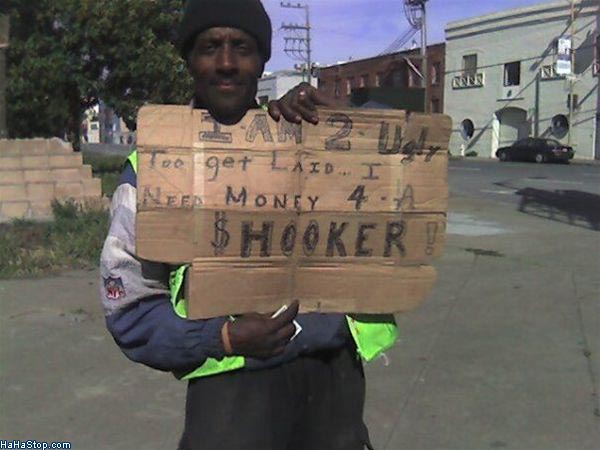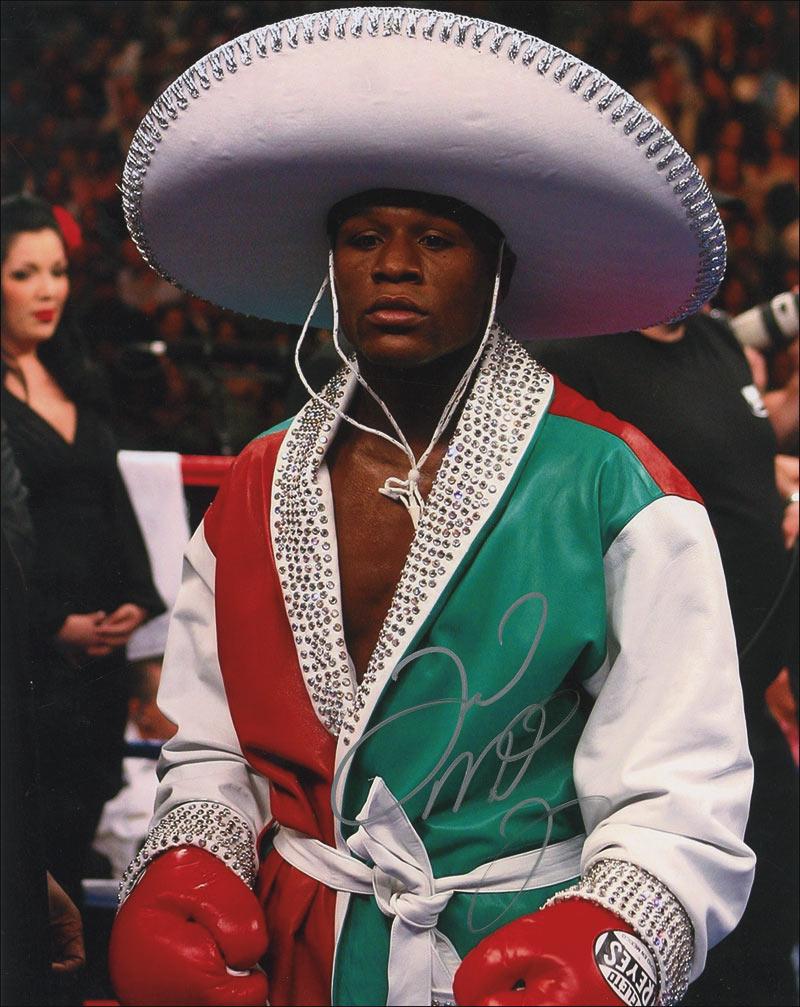This is the fusion of two of our bugbears, each indirectly related to personal finance: media idiocy and public panic. The photo is of an application for a credit card issued by First Premier Bank of South Dakota. The interest rate on purchases and cash advances is:
79.9%
A reporter from San Diego’s NBC affiliate* with some air minutes to kill manufactured a story out of the application. Here’s his impassioned defense of an innocent viewer who was just blindly applying for credit cards one day when he ended up getting impoverished. Actually he didn’t, all he did was open an envelope, but news wouldn’t be news without a little embellishment:
Hageman acknowleged that his credit isn’t perfect, but he said it’s about average. He said the pre-approved offer didn’t mention the actual interest rate on the card — for that, he had to read the enclosed fine-print disclosure. (Editor’s note: the disclosure is the pre-approved offer. The offer is the disclosure. This is a distinction without a difference. “Your honor, I didn’t hit her, my fist did.”)
“I think you’re beginning to border on deception there,” San Diego State marketing professor Michael Belch said.
No, Professor Belch. Deception would be charging 109.9% or 139.9% while listing a rate of 79.9%. What you’re commenting on is candor, the opposite of deception. Which is apparently beyond the grasp of the overeducated.
So, serious question: is a credit card with a 79.9% interest rate an atrocious deal? There are two possible answers:
- Not really.
- No.
Let’s examine them in numerical order. [For you people who would pay interest on a 79.9% credit card, that means we’ll do 1) (ONE), and then we’ll do 2) (TWO).]
1) NOT REALLY
The next credit card issuer to force someone to use its cards will be the first. Card issuers don’t tell you to buy things you can’t afford, live beyond your means, and then owe them money for the privilege of letting you buy what you couldn’t afford in the first place.
If anything, card users should be happy that banks like First Premier provide a means by which such people can spend recklessly in the first place. If credit cards didn’t exist, or if this were the 1960s and cards were only available to rich people, then anyone who would today use a 79.9% card would have to save money before spending that money. The horror.
Hageman claims his credit is “about average”, but doesn’t quantify it with, say, a credit score.** Hageman’s (and the journalist’s) complaint is essentially the following:
“You can’t trust me not to spend what I haven’t yet earned. First Premier is offering nickel beers, and here’s me, fresh out of my AA meeting.”
You don’t have to apply for the card. If you do, you don’t have to accept it. Nothing is usurious, deceitful or dishonest about First Premier’s offer. In fact, they’re being pretty clear: if you use their card, you have a month to pay off your purchase. That they give you 30 days makes First Premier far more accommodating than merchants you pay with cash, who often expect their money within 30 seconds. First Premier will cover you for the first month.
If you don’t pay off your purchase within a month – which is an eminently reasonable task you ought to be able to complete, assuming you know how to read price tags – then in exchange for their generosity, First Premier will charge you 79.9% interest.
That is perfectly fair. You signed an agreement, with mutual rights and responsibilities. First Premier honored the responsibility part of its side of the agreement, and now they’re entitled to their right: 79.9% interest on your money.
This story came to the attention of Control Your Cash after appearing on Consumerist. That site’s commenters show what happens when personal responsibility goes from being a fundamental precept of life to a vestige from our grandparents’ era. Here’s an example:
The guy who owns First Premier has donated billions to one of the local hospitals for a children’s hospitals (sic) and a research facility. It is going to take much more than that to undo the bad karma he has going on.
Engaging people in bilateral, voluntary commerce now fosters “bad karma”, as defined by the kind of person who a) believes in karma, b) thinks it has a place in an economic discussion, and c) thinks spending “billions” of dollars on “a children’s hospitals” is barely a step in the right direction.
Not that people who comment on web stories are necessarily examples of intellectual titanhood (think about that before you comment on the post you’re reading right now), but here’s another:
Which is why we need a NATIONAL usury law. Problem is these crooks have great lobbies in state governments.
Words mean what they mean, and “crook” has a fairly unambiguous definition. Crooks steal. They take what isn’t theirs. What they don’t do is enter into a voluntary contract, then honor it. Calling an honest business entity a “crook” is like saying “literally” when you mean “figuratively”. Or “black” in lieu of “white”.
Here’s one last commenter, blessed with a gift for both pithiness and renewing our faith in humanity:
Don’t like the terms? DON’T USE THE CARD!!! It’s pretty damn simple people. Where did this entitlement mentality for cheap credit card interest rates with free stuff back come from?
2) NO.
Let’s answer a question (if you forgot, it’s “Is a credit card with a 79.9% interest rate an atrocious deal?”) with a question. What’s the difference between a card with a 7.99% interest rate and a card with a 79.9% interest rate?
If you Control Your Cash, nothing. If you ring up $500 worth of charges, then transfer $500 from your bank account to First Premier within 30 days, it doesn’t matter what they charge. There is no difference between a card that charges 1% interest and one that charges 500,000% interest.
So should you accept First Premier’s offer, and happily charge purchases to your 79.9% card? After all that, no. But for completely different reasons.
The least important criterion for what credit card you should get is the interest rate. The most important is the benefits it’ll provide, for the price.
More than most cards, an American Express card can make it easy for you to reverse purchases that go awry (e.g. a brake relining that doesn’t work.) But depending on which particular American Express card you get, you might have to pay an annual fee. The standard Discover card doesn’t have an annual fee, and gives you 1% cash back on everything you buy. But it’s also useless outside the United States.
Most credit cards are free to use. If you can’t find a free one, you probably shouldn’t be using credit. And that’s what makes the First Premier card a bad deal:
The $75 annual fee.
You saw that, right? Of course you did. You read the agreement.
——————-
*Our primary passion at Control Your Cash is the responsible use of money. A close second is our hatred of journalists. In particular, television journalists. In particular, local television journalists who have neither the chops nor the ambition to progress beyond their home market(s). That’s why we don’t mention journalists by name. You can still verify the story by clicking the link, but we won’t do the journalist the courtesy of a mention.
**Why should he? Math is hard! Numbers are intimidating! Words are better than numbers, especially because you can’t prove something with the former as convincingly as you can with the latter.
**This post is featured at the 28th Carnival of Money Stories.**





